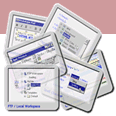Control AutoPlay (dynamically) from your program
We're going to ask Windows to send us a message when the AutoPlay is about to occur. In order to catch this message, first of all we have to override our default Windows message handler -- "WndProc()." You can do this by inserting the following code in your form's (named "Form1" for example) public declarations section:
MsgID_QueryCancelAutoPlay : Word;
procedure
WndProc( var Msg : TMessage );
override;
|
Now, type in the following code in the "implementation" section (again, assuming that your form is named "Form1") to actually handle the Windows messages. As you can see, we're only interested in catching "QueryCancelAutoPlay" messages, so we'll let the default (or the inherited) "WndProc()" handle all other messages.
procedure TForm1.
WndProc( var Msg : TMessage );
begin
if( MsgID_QueryCancelAutoPlay
= Msg.Msg )then
begin
// set Msg.Result
// to 1 to stop AutoPlay or
// to 0 to continue with AutoPlay
Msg.Result := 1;
end else
inherited WndProc( Msg );
end;
|
Finally, we have to ask Windows to actually send a "QueryCancelAutoPlay" message to our message handler by inserting the following code in the "FormCreate()" event (click on your form, go to the "events" tab in the "Object Inspector" and double click on "Create"):
MsgID_QueryCancelAutoPlay
:= RegisterWindowMessage(
'QueryCancelAutoPlay' );
|
Random Tip : Write your own help
Next Tip : Moving to the next tab stop

